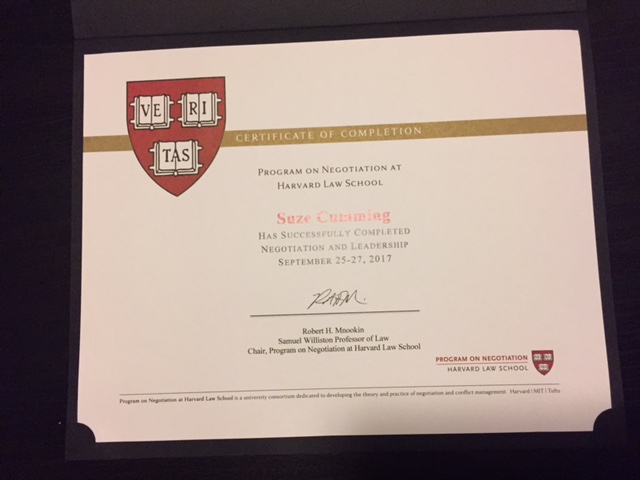What I learned at Harvard #1 – Empathy as a Diagnostic Tool
Last week I attended the Harvard University’s Negotiation and Leadership course. Wow, I learned a lot and I’d like to take the next few weeks to share some of those learnings with you and apply them directly to Real Estate.

Robert H. Mnookin, author of Beyond Winning, Bargaining with the Devil and other acclaimed books on negotiation shared his knowledge on managing the tension between Empathy and Assertiveness.
He describes empathy and assertiveness as the two central dimensions of negotiation behaviour.
His claim is that the tension between these two behaviours is key to being an effective negotiator. He goes on to explain that understanding this tension in ourselves is essential, and that understanding it in our negotiation counterpart can give us valuable insights and significant advantages.
Empathy is the process for which negotiators demonstrate an understanding of their counterpart. This entails deliberate active listening to first understand your counterpart’s interests and then to demonstrate that understanding to them. In addition, we need to be open to being corrected if we misunderstood some of their interests. He refers to this as “allowing the other party to tune up your understanding”
Assertiveness is the process by which a negotiator articulates and advocates for their interests by effectively expressing to the others side their own interests, needs and perspective.
Most of us are really good at one of these and not particularly good at the other. The objective is to develop a strong balance of skills in both of these dimensions.
We used an assessment tool to better understand our own strengths and gaps with regards to empathy and assertiveness. The different balances lead to different challenges. This assessment sorted us into Competitors (lots of assertiveness, little empathy), Accommodators (lots of empathy, weak on assertiveness), and Avoiders (those who are overwhelmed by emotional conflict, and therefor don’t engage their assertiveness or empathy- although they likely have access to both).
Once we understand our own tendencies, we next need to assess the tendencies of our negotiating counterpart and then finally, how this will affect the interaction and therefore the outcome of the negotiation.
Here is the scoop on each of these tendencies:
Competitors: (and yes, this does align well with our concept of competitive negotiators from our MCNE course)
Weaknesses:
- Too focused on the bottom line
- Neglect long-term durability of agreement
- Extract every last penny, hurting the relationship
Ways for them to improve:
- Improve listening skills
- Share control more
- Focus more on expanding the pie and creating value
- Focus more on relationship
Ways to deal with them:
- Display empathy but not weakness
- Compliment/acknowledge them
- Work to understand their interests
Accommodators: (somewhat aligned with Compliant negotiation style)
Weaknesses:
- Try to buy the relationship
- End up with deals at reservation value (low end of Zopa)
- Bid against self
Ways for them to Improve:
- When preparing, focus on ALL of your interests
- Set more ambitious distribution goal – higher aspiration
- Avoid making your reservation value into your aspiration
Ways to Deal with Them:
- Be sure that their minimum needs are met
- Be sensitive to the relationship
- Be patient and trustworthy
Avoiders: (could be Collaborative negotiators through choosing to engage with emotional intelligence)
*People can become avoiders either because they lack empathy and assertiveness, or because they have both and are therefor very sensitive to conflict and avoid it.
Weaknesses:
- Never deals with the entire problem
- Allows conflict to simmer
- Give false sense of congeniality that is misleading
Ways for them to Improve:
- Actively engage
- Be more assertive
- Work on actively listening when tempted to avoid
- Address conflict explicitly and productively
- Remember that Disagreement ≠ being disagreeable
Ways to Deal with Them:
- Create a collaborative process
- Be soft on people when being hard on issues
- Give them time when negotiations become conflicted
In real estate, we negotiate with our prospective clients, our clients and with other agents on behalf of our clients. Most often, we don’t get to choose our negotiation counterpart and so our ability to adapt to their style for the best outcome is a critical skill. Recognizing that everyone has different conflict tendencies and that we should take those under consideration when making decisions about how to proceed, will vastly improve our ability to solve problems and successfully negotiate more transactions with better outcomes.
